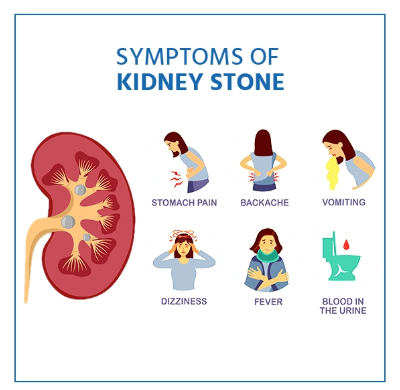Kidney stones are a common urological illness that can cause substantial pain and problems if not treated immediately. As a healthcare provider, I feel it is critical to promote awareness about the signs of kidney stones in order to assist early diagnosis and treatment. In this section, we’ll look at some of the most prevalent indications and symptoms of kidney stones.
1. Severe Pain
One of the most defining signs of kidney stones is tremendous pain, which is frequently considered as one of the most severe forms of agony a person may feel. This pain, known as renal colic, usually starts suddenly and varies in intensity. It often begins in the back or side, behind the ribs, and can spread to the lower abdomen and groin. The discomfort might fluctuate as the stone progresses through the urinary system, so it’s important to keep track of any changes in position and intensity.
2. Hematuria (Blood in the Urine)
Another typical sign of kidney stones is the presence of blood in the urine (hematuria). The blood may be apparent to the human eye, making the urine pink, crimson, or brown, or it may be minuscule and only detectable by a urine test. Hematuria develops when a stone irritates or destroys the lining of the urinary system while moving.
3. Frequent Urination and Urgency
Kidney stones can cause alterations in urine patterns. You may feel the need to urinate more frequently than normal, with a strong and persistent desire. This symptom happens when a stone irritates the bladder or obstructs the passage of urine, causing the body to attempt to remove it.
4. Painful Urination
Another typical symptom is painful urination, often known as dysuria. This burning feeling can develop when the stone reaches the junction of the bladder and the ureter, or if it causes inflammation and irritation in the urinary system. It is critical to identify this discomfort from other types of dysuria, such as urinary tract infections.
5. Nausea and Vomiting
The extreme discomfort from kidney stones can cause nausea and vomiting. This response is the result of the body’s reaction to the extreme pain, as well as the strong relationship between the kidneys and the gastrointestinal system. If you are experiencing inexplicable nausea and vomiting, as well as acute stomach or flank discomfort, you may have a kidney stone.
6. Cloudy or Foul-Smelling Urine
Changes in the look or smell of your urine may potentially indicate kidney stones. Cloudy urine or pee with a strong, unpleasant odor might suggest an illness or the presence of stones. These changes occur when germs accumulate in the urinary system or a stone obstructs the flow of urine, resulting in stagnation and infection.
7. Fever and Chills
Fever and chills are less common but can accompany kidney stones, especially if there is an underlying urinary tract infection. This combination of symptoms need rapid medical care since it may suggest a more serious disease requiring quick treatment.
When to Seek Medical Help
If you have any of the symptoms listed above, especially severe pain, blood in your urine, or evidence of infection (fever and chills), get medical assistance right once. Early detection and treatment can reduce problems and suffering.
Conclusion
Understanding the signs of kidney stones is critical for quick diagnosis and successful therapy. If you believe you have kidney stones, contact a healthcare expert for a full assessment and proper treatment.
As usual, living a healthy lifestyle, staying hydrated, and following medical advice will help lower your chances of getting kidney stones. Please book an appointment if you want more tailored advice and treatment alternatives.






Comments